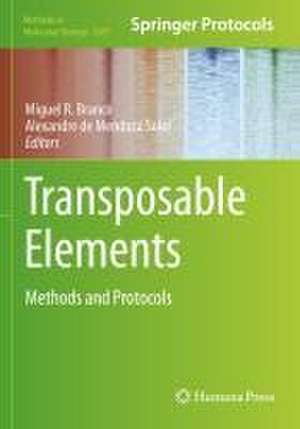Transposable Elements: Methods and Protocols: Methods in Molecular Biology, cartea 2607
Editat de Miguel R. Branco, Alexandre de Mendoza Soleren Limba Engleză Paperback – dec 2023
Authoritative and cutting-edge, Transposable Elements: Methods and Protocols aims to be a useful practical guide to researches to help further their study in this field.
| Toate formatele și edițiile | Preț | Express |
|---|---|---|
| Paperback (1) | 953.82 lei 6-8 săpt. | |
| Springer Us – dec 2023 | 953.82 lei 6-8 săpt. | |
| Hardback (1) | 1396.89 lei 6-8 săpt. | |
| Springer Us – dec 2022 | 1396.89 lei 6-8 săpt. |
Din seria Methods in Molecular Biology
- 9%
 Preț: 791.59 lei
Preț: 791.59 lei - 23%
 Preț: 598.56 lei
Preț: 598.56 lei - 20%
 Preț: 882.95 lei
Preț: 882.95 lei -
 Preț: 252.04 lei
Preț: 252.04 lei - 5%
 Preț: 729.61 lei
Preț: 729.61 lei - 5%
 Preț: 731.43 lei
Preț: 731.43 lei - 5%
 Preț: 741.30 lei
Preț: 741.30 lei - 5%
 Preț: 747.16 lei
Preț: 747.16 lei - 15%
 Preț: 663.45 lei
Preț: 663.45 lei - 18%
 Preț: 1025.34 lei
Preț: 1025.34 lei - 5%
 Preț: 734.57 lei
Preț: 734.57 lei - 18%
 Preț: 914.20 lei
Preț: 914.20 lei - 15%
 Preț: 664.61 lei
Preț: 664.61 lei - 15%
 Preț: 654.12 lei
Preț: 654.12 lei - 18%
 Preț: 1414.74 lei
Preț: 1414.74 lei - 5%
 Preț: 742.60 lei
Preț: 742.60 lei - 20%
 Preț: 821.63 lei
Preț: 821.63 lei - 18%
 Preț: 972.30 lei
Preț: 972.30 lei - 15%
 Preț: 660.49 lei
Preț: 660.49 lei - 5%
 Preț: 738.41 lei
Preț: 738.41 lei - 18%
 Preț: 984.92 lei
Preț: 984.92 lei - 5%
 Preț: 733.29 lei
Preț: 733.29 lei -
 Preț: 392.58 lei
Preț: 392.58 lei - 5%
 Preț: 746.26 lei
Preț: 746.26 lei - 18%
 Preț: 962.66 lei
Preț: 962.66 lei - 23%
 Preț: 860.21 lei
Preț: 860.21 lei - 15%
 Preț: 652.64 lei
Preț: 652.64 lei - 5%
 Preț: 1055.50 lei
Preț: 1055.50 lei - 23%
 Preț: 883.85 lei
Preț: 883.85 lei - 19%
 Preț: 491.88 lei
Preț: 491.88 lei - 5%
 Preț: 1038.84 lei
Preț: 1038.84 lei - 5%
 Preț: 524.15 lei
Preț: 524.15 lei - 18%
 Preț: 2122.34 lei
Preț: 2122.34 lei - 5%
 Preț: 1299.23 lei
Preț: 1299.23 lei - 5%
 Preț: 1339.10 lei
Preț: 1339.10 lei - 18%
 Preț: 1390.26 lei
Preț: 1390.26 lei - 18%
 Preț: 1395.63 lei
Preț: 1395.63 lei - 18%
 Preț: 1129.65 lei
Preț: 1129.65 lei - 18%
 Preț: 1408.26 lei
Preț: 1408.26 lei - 18%
 Preț: 1124.92 lei
Preț: 1124.92 lei - 18%
 Preț: 966.27 lei
Preț: 966.27 lei - 5%
 Preț: 1299.99 lei
Preț: 1299.99 lei - 5%
 Preț: 1108.51 lei
Preț: 1108.51 lei - 5%
 Preț: 983.72 lei
Preț: 983.72 lei - 5%
 Preț: 728.16 lei
Preț: 728.16 lei - 18%
 Preț: 1118.62 lei
Preț: 1118.62 lei - 18%
 Preț: 955.25 lei
Preț: 955.25 lei - 5%
 Preț: 1035.60 lei
Preț: 1035.60 lei - 18%
 Preț: 1400.35 lei
Preț: 1400.35 lei - 20%
 Preț: 817.30 lei
Preț: 817.30 lei
Preț: 953.82 lei
Preț vechi: 1163.20 lei
-18% Nou
Puncte Express: 1431
Preț estimativ în valută:
182.53€ • 186.93$ • 151.84£
182.53€ • 186.93$ • 151.84£
Carte tipărită la comandă
Livrare economică 18 martie-01 aprilie
Preluare comenzi: 021 569.72.76
Specificații
ISBN-13: 9781071628850
ISBN-10: 1071628852
Ilustrații: XII, 382 p. 65 illus., 60 illus. in color.
Dimensiuni: 178 x 254 mm
Greutate: 0.69 kg
Ediția:1st ed. 2023
Editura: Springer Us
Colecția Humana
Seria Methods in Molecular Biology
Locul publicării:New York, NY, United States
ISBN-10: 1071628852
Ilustrații: XII, 382 p. 65 illus., 60 illus. in color.
Dimensiuni: 178 x 254 mm
Greutate: 0.69 kg
Ediția:1st ed. 2023
Editura: Springer Us
Colecția Humana
Seria Methods in Molecular Biology
Locul publicării:New York, NY, United States
Cuprins
An overview of best practices for transposable element identification, classification and annotation in eukaryotic genomes.- Assembly-free annotation and quantification of transposable elements with dnaPipeTE.- Best practice for the identification of horizontally transferred transposons.- Genotyping of transposable elements insertions segregating in the human populations using short-read re-alignments.- A Pangenome approach to detect and genotype TE insertion polymorphisms.0 Experimental validation of transposable element insertions using the Polymerase Chain Reaction (PCR).- Quantification of LINE-1 RNA expression from bulk RNA-seq using L1EM.- Genome-wide profiling of L1 DNA methylation by bs-ATLAS-seq.- Nanopore epigenomic analysis of transposable element DNA modifications.- Targeted resequencing and methylation analysis of L1 elements by nanopore sequencing.- Inferring protein-DNA binding profiles at interspersed repeats using HiChIP and PatChER.- Affinity-based Interactome Analysis of Endogenous LINE-1 Macromolecules.- LINE-1 retrotransposition assays in embryonic stem cells.- Detecting somatic transposable element insertions in Drosophila tissues.- Precise and scarless insertion of transposable elements by Cas9-mediated genome engineering.- Epigenetic editing of transposable and repetitive elements.- Using CRISPR to investigate the regulatory activity of transposable elements.
Textul de pe ultima copertă
The volume presents a small selection of state-of-the-art approaches for studying transposable elements(TE). Chapters guide readers through HTS-based approaches, bioinformatic tools, methods to studyTE protein complexes, and the functional impact on the host. Written in the successful Methods in Molecular Biology series format, chapters include introductions to their respective topics, lists of the necessary materials and reagents, step-by-step, readily reproducible protocols, and notes on troubleshooting and avoiding known pitfalls.
Authoritative and cutting-edge, Transposable Elements: Methods and Protocols aims to be a useful practical guide to researches to help further their study in this field.
Authoritative and cutting-edge, Transposable Elements: Methods and Protocols aims to be a useful practical guide to researches to help further their study in this field.
Caracteristici
Includes cutting-edge methods and protocols Provides step-by-step detail essential for reproducible results Contains key notes and implementation advice from the experts
